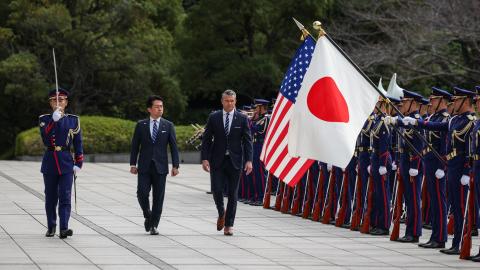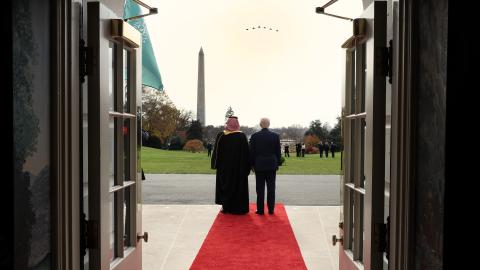In this week’s episode of China Insider, Miles Yu details the recent termination of United States federal grants for US Agency for Global Media outlets including Voice of America, and what this means for information access in China. Next, he explores Niger’s decision to expel three Chinese oil executives over wage disputes between local and expatriate workers from China. Finally, Miles digs into the recent unclassified report on corruption within the Chinese Communist Party’s leadership by the Office of the Director for National Intelligence and discusses the implications of these findings on Xi Jinping’s ongoing anti-corruption campaigns.
China Insider is a weekly podcast project from Hudson Institute’s China Center, hosted by China Center Director and Senior Fellow, Dr. Miles Yu, who provides weekly news that mainstream American outlets often miss, as well as in-depth commentary and analysis on the China challenge and the free world’s future.
Episode Transcript
This transcription is automatically generated and edited lightly for accuracy. Please excuse any errors.
Miles Yu:
Welcome to China Insider, a podcast from the Hudson Institute's China Center. I am Miles Yu, Senior Fellow and Director of the China Center. Join me each week for our analysis of the major events concerning China, China threat and their implications to the US and beyond.
Colin Tessier-Kay:
It is Tuesday, March 25th and we have three topics on the docket for this week. First, we unpack the termination of US federal grants that sustain the operations of Voice of America, Radio Free Asia and Europe, and the rationale behind this move. Second, Miles takes a look at Niger's recent expulsion of three top Chinese oil executives from CNPC over wage disparities. And lastly, we discussed the recently released report from the office of the Director of National Intelligence regarding corruption among CCP leadership. Miles, how are you doing today?
Miles Yu:
Very good, Colin. Nice to be with you again.
Colin Tessier-Kay:
Likewise. So we start things off this week with the recent termination of federal grants that fund the operations of several government funded media outlets, including Voice of America, Radio Free Asia and Europe, and Radio Liberty among others, in an event the media has labeled Bloody Saturday. Since the grant terminations were announced Radio Free Asia informed hundreds of US-based staff on Wednesday of last week that they would be put on unpaid leave, and more than 1,300 Voice of America employees were placed on leave as well. RFA spokesperson, Rohit Mahajan claimed the move was unlawful and that RFA would pursue legal action as a result. Miles, could you please share with us your take on this development and perhaps a little bit more to the history of the importance of these media outlets like Voice of America?
Miles Yu:
Yeah, this is a major move in the landscape of American foreign broadcasts. Foreign broadcast, obvious is a very important part of the American public diplomacy. There sort of a suspension of these programs obviously is a very, very big deal. It has caused a lot of repercussions, particularly closing down Radio Free Asia, which is pretty much a bipartisan effort established in the late 1990s by a bipartisan sentiment led by Senator Jesse Helms and a whole bunch of democratic senators. So this is a big deal. Personally, I think there definitely needs a lot of reform and the waste cutting. To get rid of this institution altogether, it needs a little bit of caution. So that's my overview take on these moves. You asked me about the history of the American foreign broadcast including Voice of America. Well, that's a very, very long story.
It started during World War II. President Roosevelt established something called the Office of Strategic Services in 1942. The whole idea is to basically combat the Nazi disinformation, enemy propaganda. That's number one. Number two is to basically tell the world what America is all about. It always has this component of counter enemy propaganda and also to promote American value and government positions. Of course, the Office of Strategic Services has two aspects of that. One is the so-called the black news. Another one is white news. So many people feel uncomfortable about using this platform to sort of you know solely as a weapon of information. So they split in the middle of 1942 from the OSS into something called the Office of War Information. The purpose of this is to create, it was created, to coordinate all US government information services during World War II, including propaganda abroad and morale boosting at home. The whole purpose of this is basically to broadcast what we call the white news. And the motto of the Office of War Information is that the news may be good or bad, but we shall tell you the truth. And that is basically the legacy of this wartime broadcasting.
Now, when the war was over in the 1950s, the Soviet propaganda and the weaponization of information was so rampant that President Eisenhower established something called the US Information Agency, USIA in 1953. That agency, USIA, was under government supervision, existed for several decades until 1999. It was officially disbanded. The key objective of USIA was to promote US culture and values, counter Soviet disinformation, and manage broadcasting and cultural diplomacy globally. So it always has a very strong government supervision in this whole enterprise. It's broadcast in arms of the USIA is Voice of America, and then later on it will be a Radio Free Europe and Radio Liberty. So in the sixties there's also new programs, that is, Radio Marti that is geared toward Cuba. So you might see this is a very important development that is basically the premier US voice. It truly is the Voice of America. It has enormous impact in the world. I myself was born and raised in China and I think my understanding of America, what it means, what it stands for, was mostly by listening to Voice of America, the mandarin services, which was fantastic. It was the light of a beacon for generations of young Chinese.
And it was obviously disbanded in 1999 after the Cold War was over. And all these other broadcasting services were moved to a new entity, and it's called the Board of Broadcasting Governors, BBG. The BBG was a product after the passage of a disastrous, terrible congressional act in 1994. It's called the 1994 US International Broadcasting Act. And I'll tell you a little bit later about that. So the BBG existed until 2018, which was renamed into something called the US Agency for Global Media, USAGM, which is now the supervising agency of all these foreign broadcaster radios and freedom radios including Radio Free Asia and Radio Free Europe. So this is the basic history.
Now the problem with all this thing is, you see, America's foreign broadcasting stations always existed in this environment where there were foreign adversaries there. During World War II it was the Nazis and the Japanese military government, propaganda arms under it. And during the Cold War it was combat the Soviet disinformation and Chinese propaganda. So what happened is when the Cold War was over in the overall atmosphere of kumbaya, the United States and its intellectual political elite mistakenly realized, mistakenly believed, that the world has no more ideological enemies. Or, as Francis Fukuyama famously said, history has ended. So in that blind triumphalism, the US government enacted a law that's the 1994 US International Broadcasting Act. According to that law, the US government give up its supervision power over all those freedom radios and including Voice of America, establish something separate from government supervision, and to later run as if it's another domestic radio station and radio entities. So over the years, since 1994 and particularly after the establishment of BBG, Voice of America and many radios were run like another NPR. So it's domestic oriented and it gives a lot of leeway for partisans to push for domestic agenda without government supervision. So yes, their audience were abroad, but they were basically broadcasting American’s domestic partisan agenda and that is a problem. So there's a firewall.
Now, that problem continued in the Trump administration 1.0, first term. I served in that administration, I know this pretty well. So the Trump administration, the first term, realized problem. So they had to restore some kind of sanity to it and they rehired an old information warrior by the name of Bob Reilly to be the Voice of America’s director, but he met a lot of resistance and become totally woke. I can guarantee you that's the case because one of the last trips that Secretary of State Mike Pompeo made was to Voice of America where he was supposed to give a speech. He did go in, he did go, but there was shouting, protesting, against American stand in the Middle East, they are against American imperialism. These are the headquarters of Voice of America. When the Secretary of State was shouted down, this is absurd. So that's why there is a realization that this has to end. Now having said that, there is definitely need to reform, but we have to really, really put this Voice of America and other freedom radios under government supervision because we're not living in a vacuum globally. We're living in a world. The Chinese, the Russians, the Cubans, the Iranians, North Koreans are running enormous propaganda enterprises targeting the United States and Western values. We have to really combat that. So that's why I think restoration of government supervision, restoration of public accountability is very key for reform not to gut it altogether.
Colin Tessier-Kay:
Yeah, that's an exceptional history lesson there and I thank you for that. And I should also clarify that while the termination of federal grants has been announced, the situation is ongoing and likely will result in some lengthy litigation, but it also raises the questions of exactly what's next for these media outlets going forward. US Representative Mike McCaul issued a statement early last week noting his appreciation of the US Agency for Global Media, and RFA specifically, to disseminate information within China that is otherwise censored by CCP firewalls. Miles, I'd like to ask you what exactly is the way forward from here? And maybe you can help us understand a little bit what the impacts of this will be for information dissemination within and without of China.
Miles Yu:
I think it's to restore to the old model of USIA, to make the Voice of America and other freedom radios accountable to American government and taxpayers and to basically tell the truth about America. You cannot broadcast to the world and win prizes for a long series about American slavery. Yes, it is important to tell the truth, but that's not the whole truth. America is a beacon of freedom and to end slavery, Americans got into the Civil War. That should be a glorification of American values, not the condemnation of the American system. So in other words, I think that Voice of America should live up to its name. It's Voice of America, it is not Voice of Bad America. So this is the whole point. I think the State Department in particular should gain the supervision power over Voice of America. You can still run, I mean editorially, you can still be independent, but you have to really show the world what America is really about. It's not just a part of the domestic debate about American policies, some of the issues.
So people in the world, depend on this and some other services, for example, Radio free Asia is absolutely crucial to fight Chinese propaganda globally. Radio free Asia is pretty much immune to all these ills I was talking about earlier about the wokeness. Because you might also have to say this, some of the programs like Radio Free Asia, like National Endowment for Democracy, some of the people from MAGA America, from Reagan conservative range, they play very important role. So it's bipartisan. Not all of them want wokeness. So you have to really be quite nuanced in dealing with this reform. I think it should be reformed, and I also think that we have to cut the waste, but we are not living in a world without adversaries. US foreign broadcast always, always be existing in the environment where there are foreign adversaries to attack our system, to attack our values, and to shuffle out, to stifle the Voice of America. So that's why it's crucial. It's really a battle of public soul.
Colin Tessier-Kay:
And moving to our next topic for today, speaking of adversaries, we shift to West Africa where Niger’s junta has recently expelled three top Chinese oil executives linked to China National Petroleum Corporation or CNPC regarding disputes over salary, disparities between local and expatriate workers from China. Analysts report this move as part of a broader shift by West African regimes to reassert control over domestic natural resources and maintain legitimacy against foreign influence. But Miles, maybe you can tell us a bit more about this latest specific development in Niger and how this all came about.
Miles Yu:
Well, Niger used to be friendly to China. China took the advantage, it's been about 27 years, to fuse an enormous amount of money into Niger, which is a landlocked country in West Africa. So China basically wanted its oil. The oil is not necessarily a huge amount, but is important for China to have the foothold there. So government was very receptive to Chinese money. And then last year, mostly with the help of Russia, the Wagner Group, there was a coup. The coup basically took over the country and they began to demand the Chinese companies, basically under the China National Petroleum Corporation, CNPC, to show its books and the Chinese company refused. And also in order to get into the oil to the open sea, China has to build a pipeline through the neighboring country Benin. So there's a huge Chinese investment in the pipeline business called West African Oil Pipeline Cooperation. That's the WAPCO. And also of course you cannot really, they also can build a refinery. It is called SORAS. So there's three Chinese entities over there, plus there's a huge hotel built by China to mostly house the Chinese workers and the executives over there.
There's an issue here. Number one, all the Chinese enterprises in Niger and Benin act as if they own the country. So they exclude the Niger employees from checking into the hotel for example. And also there's a huge pay disparity. The Chinese employees in those enterprises in Niger earn an average about $8,600 a month compared to the $1,200 for Nigerien counterparts. And this is fundamentally unfair. That's why Niger government was very, very mad about this. China basically doesn't want to budge. Despite its consistent attempts to address these inequalities, the disparities persisted. So that's why the government, the military government of Niger took action to expel three key Chinese oil executives from Niger within like two days. So that's basically the case.
Colin Tessier-Kay:
Yeah, I think China's influence in the African continent has been well documented and certainly predates at least Xi Jinping's tenure. But especially since the onset of China's Belt and Road Initiative and as it concerns African nations, much of the conversation has revolved around natural resource extraction and critical and rare earth minerals mining. These development initiatives are linked to China's BRI and have led to several issues with partner nations beyond just Niger and have effectively led to debt trap scenarios that result from China's predatory development loan practices. Miles, I'd like to get your take on whether this development is more or less an isolated incident or might this be a turning point for China's attempted bilateral ovations in Africa and we start to see sort of a souring of relations.
Miles Yu:
Niger is by no means an isolated incident. I mean there is a prevailing sense of disenchantment against China. Now China, having said that, China has an enormous influence in Africa. Virtually every country has received Chinese money in Belt and Road Initiative, but all countries are facing the same problem. Democratic Republic Congo, DRC, in January just several weeks ago, sentenced three Chinese nationals to seven years in prison and fined $600,000 for illegally exploiting mineral resources in the DRC. Basically, the Chinese guys go over there and they think they got the license to do everything they want and they completely disregard the local governments concerns about environment, about rights. Plus those Chinese nationals always practice something they have been doing domestically inside China that is fraud, bribery, money laundering, looting even. So this is the problem. That's why the DRC government sentenced three guys to seven years in prison.
Now, two years back, the African giant country of Nigeria also cracked down on illegal Chinese mining. This was in August, 2023. Nigerian government terminated the operation license for the Chinese company called Ruitai Mining Company. It’s a Chinese firm which involved in illegal mining of titanium, and this move was part of the broader efforts to assert greater control over the countries, the mineral resources, and address the environmental and the legal concerns associated with unauthorized mining activities conducted by the Chinese companies. Now there's another country in that area, the Central African Republic, and they revoked the Chinese mining license in June, 2024. So you have this case over there involved a company called Daqing SARL. In Kenya, this is a slightly different story, in Kenya you have this Chinese company, retail company, called the China Square, which is pretty big. Now this company is killing Kenya retail business, which is why a lot of local retailers expressed concern, outrage over unfair competition and potential job losses. So this is by no means an isolated Niger phenomenon. It is Africa wide.
Colin Tessier-Kay:
Yeah and I think that's really important to keep an eye on as these developments continue on. The eight to one wage gap disparities between expatriate Chinese workers and local Niger workers seems to be the impetus for this event, but I could only see this snowballing from there.
We now move to our final topic for today and look to discuss the recently unclassified report from the Office of the Director of National Intelligence titled “Wealth and Corrupt Activities of the Leadership of the Chinese Communist Party”. For our listeners, this report can be found on the DNI website at dni.gov. A little brief background. The report focuses specifically on corruption among the leadership and senior level officials of the CCP and specifically names a few individuals including former Premier Wen Jiabao and current President Xi Jinping as individuals who “had amassed significant wealth” in conflict with stated CCP practices. Miles, why don't we start with an overview of this report for our listeners, what prompted ODNI to release it and highlight some of the key findings here that were reported?
Miles Yu:
The report itself is not that significant. It's just a couple pages long. It's the fact that it was released by a intelligence agency, that is significant. This is done mostly because of congressional mandate. Congress say you got to do this. They are listing to fulfill obligation to the Congress. Now of course it's much deeper than just two pages, the listing. So you mentioned about the corruption by Xi Jinping and Wen Jiabao, the former premier. This is important too because even though the mention was kind of [unintelligible], but the fact that Xi Jinping and Wen Jiabao are known as China's corruption busters and this itself is very ironic. The cop itself is criminal. So that's why it's very, very important. That shows you that China is a one party rule. People always joke about this whole thing. People say, oh, who is the richest man in the world? It’s Elon Musk. No, Elon Musk is a poor peasant compared to what the Chinese Communist Party bosses are when it comes to wealth. Because the richest man in the world definitely is Xi Jinping because he basically has a whole nation's resources at his disposal. That's why you cannot use the normal wealth measure to say who is the richest, who is the second richest person? Xi Jinping is.
The CCP is one party rule. It has a lot of power. Power without oversight breeds impunity. And Xi Jinping and his CCP is above the law. There is, yes, there's a public law, but there is also internal discipline. Internal discipline of the Chinese Communist Party trumps public oversight and public law. So secondly, the reason why there's so many corruptions is because there's an opaque bureaucratic system. Promotions in China are based upon political loyalty and the connections, guanxi, who is your boss and how much grease you give to the guys who are promoting you. So leaders often control vast resources and appointments making corruption a byproduct of unmonitored power. So it's all about political power.
And on top of that you can see the Chinese economic system is very peculiar. It's a two track system. On one hand, state-owned enterprises are the most important industry in China. On the other hand you also have some non-state factors, but the state-owned enterprises, the SOEs, those officials, they have control or influence over SOEs given the opportunities to kickbacks, insider deals and embezzlement. The fusion of political and business enable collusion and self-dealing. And SOEs is a major source of piggy banks for corrupt officials, especially those in finance, energy and construction. So now I mentioned about the state owned SOEs and also non-state factors. All of the Chinese companies, which is sort of a hotbed for corruption, and they have access to global financial system. The elite families launder money overseas through real estate, offshore accounts, and shell companies. Xi Jinping's family was worth a lot because they can use this kind of connection to global financial market and system to transfer enormous amount of state assets into their own personal account. International loopholes and complicit banks enable illicit wealth transfers despite China's capital control. So some officials use relatives, they're known as white gloves, 白手套, to hide assets abroad. This is the reason why this is the major methods used by Xi Jinping and Wen Jiabao to hide their assets overseas.
Now one of the most important phenomenons in China recent decades is the rapid rise of the military power. Chinese military has a lot of money, but the military development is coupled with something called a civil military fusion. And so a lot of companies have a military patronage. And so the military guy, senior military officials, most notably the former Vice Chairman of CMC, the highest ranked uniformed officer, Xu Caihou. And he was caught selling ranks and promotions, which is really unfair to him because he is not the only one who does this. A lot of guys are doing this. It is a system. So all those civil military fusion blurs the line between civilian and the military budgets and created new opportunities for corruption in tech and the defense procurement system.
So of course you have all kinds of factions inside the Chinese Communist Party and they use corruption charges to sideline rivals. And this is something that's kind of a byproduct of the anti-corruption campaign. As a matter of fact, in front of the prescription, Xi Jinping, this is one of his major weapons to get rid of his political, real or potential, rivals. And you can see every single guy he purged, no matter how clean or how corrupted they are, there's always in the name of anti-corruption. So this is China. That's why the release of the ODNI report on China's leadership. Corruption is significant even though it's [unintelligible], but at least give the world a glimpse of the problems of corruption in China. So all in all, you got all those problems. That's uniquely China. That's why corruption is so rampant. It's caused by, as I said earlier, no checks and balances, bureaucratic opacity, SOEs and state control and global financial network access, civil military patronage, political factionalism. And basically also it's not just about leadership. The Chinese society is one replete with some cultural norms that is not really modern. For example, the overall reliance on guanxi, basically it's a very good way to promote and breed corruption.
Colin Tessier-Kay:
And I think to piggyback off of that, back in 2012 or at least around the time when Xi Jinping first came to the presidency, he announced that his first major priority, as you mentioned as president, would be a robust anti-corruption campaign across the CCP and PLA, especially among its leadership and senior officials. And included in the report from ODNI to date, they've tracked that these campaigns have resulted in the investigation and convictions of nearly 5 million officials at all levels of government, national, provincial, and local. This is just something that is completely put into perspective and we've discussed on China Insider before the numerous disappearances and purges of government and military officials related to the campaign investigations, the anti-corruption campaign investigations. But given the high levels of corruption noted in this report, the validity of these anti-corruption campaigns under Xi's leadership is certainly called into question and also further implicates himself as a corrupt official. Miles, with the short time we have left today, I'd like to ask, might there might this report have any impact on Xi Jinping and his cadre's legitimacy within the CCP itself or is his current grasp on power within the party pretty well secured?
Miles Yu:
Well the communist party does not have legitimacy to begin with. I mean it's always the case in the eyes of Chinese people. The Chinese government derive its legitimacy primarily from the communist ideology, the so-called the logic of history, during the vanguard of the proletariat, all those kind of mumbo jumbo. Nobody believe that. So corruption by the way, does however affect people's belief in the legitimacy of the government. Corruption is in symbiosis with the Chinese Communist Party. From the very beginning, Mao Zedong's major campaign in 1950s, when communist party took over the country, only a few years earlier had this problem of corruption. That's why he launched three-antis, five-antis have all this rid of corruption problem. It's institutional. It's systemic, it's not individual virtues of merits. Deng Xiaoping had the same problem. I mean the Tiananmen Rebellion of 1989 to a large extent was fueled by ordinary Chinese people's resentment against government corruption, particularly by the children of the senior officials, the princelings. So there were smugglers and there were kinds of beneficial from China's special economic zones. So this is a huge resentment, a huge problem.
So the Chinese government government's legitimacy has lost to a large part in the eyes of most Chinese, I would say in 1989. Now Jiang Zemin had the same problem. Remember he warned the nation. There is a major problem with the People's Liberation Army. He tried very hard to separate the Chinese military from business. The irony is that Jiang Zemin himself is probably the most corrupt Chinese senior officials of all time. Xi Jinping now face this problem of corruption. So it is nothing new, it's systemic, it shares symbiosis with the totalitarian regime of Chinese Communist Party. As I say, power without supervision breeds impunity and corruption. And you can see it's not just about Xi Jinping and Wen Jiabao.
I mean you look at this, in 2012, Xi Jinping purged this guy Bo Xilai. This guy was also very, very corrupt. He was charged with bribery, embezzlement. He's now serving lifetime in prison. Xu Caihou as I mentioned, Vice Chair of Central Military Commission. And Zhou Yongkang, a former Politburo Standing Committee member, the guy who's in charge of China security, he was charged with bribery, abuse of power. He's now serving a lifetime sentence in jail. Ling Jihua, he was top aid to Hu Jintao. This is one Politburo members, right? He was also charged with bribery and he's now serving a life sentence. Sun Zhengcai, the Politburo member who is the boss of Chingqing for a long while, and he's now charged with bribery and he's serving life sentence as we speak right now. And you can say the Chinese former Minister of Justice Fu Zhenghua, he's also charged with a bribery. He is serving a death sentence with two year reprieve. And the only guy however who's actually executed was Lai Xiaomin. He's the head of China Huarong Asset Management. He does not have strong enough background, he does not have strong enough patron in the Politburo and the Standing Committee of the Politburo. So that's why he's executed for bribery of 277 million US dollars. He was executed in 2021. So you can see China is the empire of corruption. So this is why it's not really sort of isolated incident for Xi Jinping to be billed as corrupted. So ODNI actually, the report is important, but whatever is disclosed there, I will say is only a tip of the iceberg.
Colin Tessier-Kay:
And certainly more to follow. But unfortunately we've reached our time for this week. Miles, as always, thank you for your expert analysis and insight in this week's issues and we'll check back in with you again next week.
Miles Yu:
Alright, looking forward to being with you next week again.

















